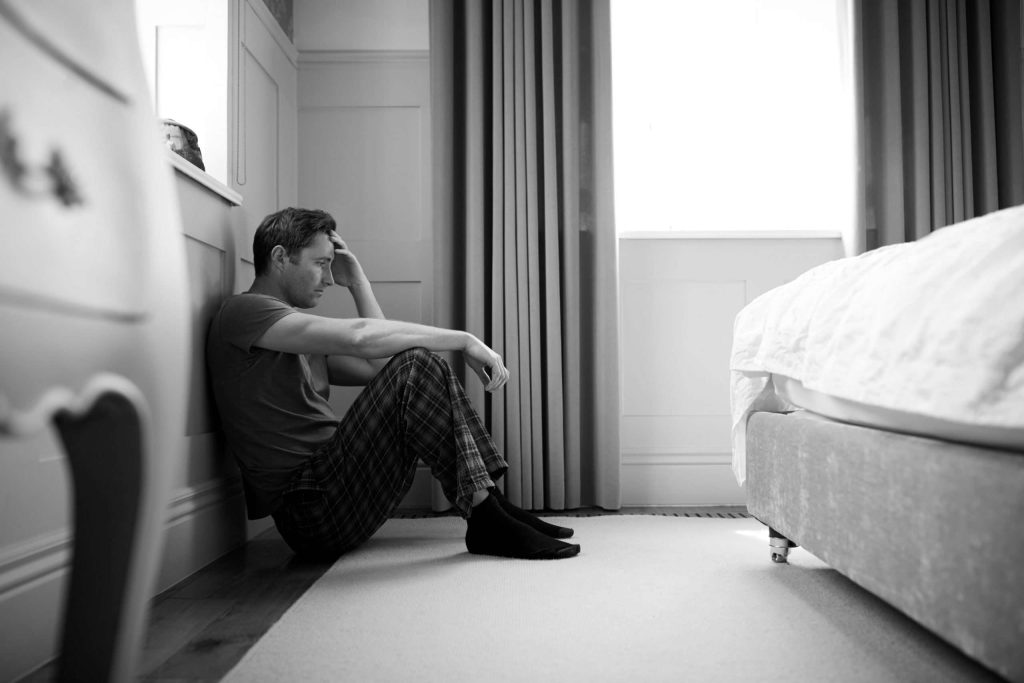Signs of Depression in Men: It Hits Differently

When it comes to depression, perhaps the most important thing to remember is: You’re not alone. Rates of depression have been climbing for years, and the stresses of the COVID-19 pandemic only kicked that trend into overdrive. The silver lining to this cloud is that the increasing prevalence of depression has led more people of all areas, genders, occupations, and economic classes to open up about their struggles.
Signs and Symptoms of Depression
As you hear other people talk about their symptoms and the effects depression has had on their lives, keep in mind what might be the second most important thing to remember: Everyone experiences depression differently.
Just as no two people are exactly alike, no two people suffer in exactly the same way. And just because your symptoms or struggles aren’t exactly like someone else’s, or you don’t think you’re feeling them quite as acutely, doesn’t mean you’re not suffering from depression too.
Men vs. Women: Depression Manifests Differently
For one example, there are some meaningful ways in which depression manifests itself very differently in the lives of men and women. That’s not to say that the two are completely different in the way they react to and deal with their issues.
According to the National Institute of Mental Health, there are a number of common threads, including the old standbys:
- Feelings of emptiness and/or hopelessness
- Persistent fatigue
- Swings in appetite
- Loss of interest in activities one used to find enjoyable
But there are a number of symptoms that, for the most part, are unique to men—many of them stemming from the stereotypical roles that, even in our supposedly more enlightened 21st-century society, men are expected to play.
Symptoms that Commonly Manifest Differently in Men
Below are a few significant symptoms that generally manifest more commonly in men than women. Recognizing these symptoms and what they stem from is critical to getting the help we need and finding some hope for more positive, fulfilling lives.
Withdrawing from family and friends or becoming isolated.
True, this is something both men and women can experience as depression takes hold, but for men it’s often more pronounced.
For better or for worse, women are frequently expected to be the social planners or “cruise directors” in their households; they are more likely to have stronger social networks containing close friends with whom they feel comfortable sharing their problems.
Men, on the other hand, are more likely to be “lone wolves” with only a few close friends—and outdated gender stereotypes have taught many of them that it’s a sign of weakness to talk about their emotions or struggles, even with those ride-or-die buddies.
Basically, as a result of both nature and nurture, it’s a lot easier for men to withdraw from friends, family members, and even partners. So easy, in fact, that they don’t even realize it until the situation has reached crisis level.
Take stock of your relationships with friends and family and ask yourself:
- How long has it been since you last spoke to some of these people?
- Are there things you’ve been meaning to say to them but haven’t?
- Are any of them close enough that you’d be willing to open up to them, even if it’s about an uncomfortable topic?
Problems with sexual desire and performance.
This is a tricky subject as it relates to depression, since issues with sexual stamina and potency are simply a fact of life for many men as they age. But that just makes it more important to pay attention to potential problems and take them seriously.
- Has a decrease in desire or performance been slow and gradual, or has it come on more suddenly, possibly linked to an increase in stress?
- Is it a just-once-in-a-while thing, or is it a consistent problem?
- Is it creating tension in a relationship?
One mistake many men make is treating a healthy sex life as a “perk”—something that’s nice to have but that they can do without if they have to, like heated seats in a new car. But sex is more than just a “nice to have,” and problems with one’s sex life are frequently indicative of deeper issues with one’s physical and mental health. Don’t minimize these problems just because you assume they “come with the territory” of getting older.
Turning to alcohol and/or drugs.
Sure, depressed people of both genders have been “drowning their sorrows” since the beginning of time. But men drink more than women in general, men are almost twice as likely to binge drink, and men are almost twice as likely to develop alcoholism. And in a really twisted way, because the ability to tolerate large amounts of alcohol is so often seen as a sign of machismo, men can convince themselves that seeking out a bottle rather than a close friend or therapist is actually the more appropriate, “manly” way of dealing with their problems.
But remember: You cannot cure depression with a depressant, whether it’s a cocktail, an opioid, or anything else. And “I can handle my booze, I’m not going to become an alcoholic” have been famous last words for generations of men who’ve let themselves tumble down a dangerous path.
Engaging in high-risk activities.
Here again, we’re up against societal pressures and stereotypes. Because they’re viewed as the more aggressive gender, men are already prone to taking greater risks in everything from business and finance to sports and driving too fast on the freeway. But add depression to the mix, and a man’s increasingly desperate need to hit that dopamine button, to find some joy in life, can lead him to activities far less savory than auto racing or bungee jumping.
Maybe he turns to drugs or alcohol, as mentioned previously. Maybe he tries to be a real daredevil by drinking and driving. Maybe he risks destroying his family by committing adultery or gambling money his household can’t afford to lose.
It’s fine to take some risks in life. If it weren’t, there wouldn’t be stock markets or skydivers. But before you take a risk, ask yourself how many people besides you could potentially be impacted if things go sideways—your wife, your kids, your business?
Then ask yourself whether you’re doing it out of joy or desperation—do you feel like you have a memorable life experience to gain, or nothing left to lose? A bit of soul-searching may reveal that the activity in question isn’t just fun and games, and somebody can get hurt.
Seek Help
Of course, another difference between women and men is that women are significantly more likely to seek treatment for their mental health struggles. But that leads us to one last very important thing to remember about depression: There’s nothing weak or “un-manly” about turning to therapy and getting help.
Just as everyone experiences depression differently, everyone responds differently to counseling, so it’s not necessarily a magic bullet. But it’s always better than doing nothing and continuing to believe you belong on life’s trash heap. Maybe the “real men don’t go to therapy” stereotype should be tossed onto that trash heap instead.
The Redeemed
If you would like to tell your story, talk, or have someone listen without fear of being judged or censored, please contact The Redeemed.
In these challenging, uncertain times, many men feel broken and alone. The Redeemed aims to show them they’re not alone in their brokenness, and that God’s love and strength are available to them too—not in spite of their human failings, but because.
More Posts From The Redeemed
The Redeemed offers articles and resources on spiritual growth, relationships, family, overcoming trauma and loss, and more. Providing guidance for incorporating Biblical teachings into our everyday lives.

The Discipline of Self-Denial: Why Christian Men Need Prayer and Fasting
We live in a culture obsessed with self-indulgence. From the moment we wake up, we’re told we deserve more: more comfort, more success, more experiences, more stuff. Bigger is better. Newer is necessary. If something feels hard, inconvenient, or uncomfortable, we’re encouraged to avoid it or upgrade out of it. The message is constant and convincing: you owe it to yourself.

From Darkness to Light: How Jesus Brings Hope to Men in Dark Seasons
One of the most iconic parts of the Christmas season is the lights. They’re everywhere: on our houses, wrapped around our trees, lining our streets. But for a lot of men, all the brightness on the outside only highlights how dark things feel on the inside. We know the world is broken. We feel the weight of our own failures. And no matter how many lights we hang, they can’t hide the truth that sometimes life feels pitch black.

Finding Rest in a Restless World: Biblical Wisdom for Escaping Hurry
We wake to alarms, rush through coffee, fight traffic, answer emails, juggle meetings, pick up the kids, mow the lawn, scroll ourselves to sleep, and then wake up and do it all over again. But beneath the hum of productivity and performance, most of us are bone-tired. Our souls are weary.




